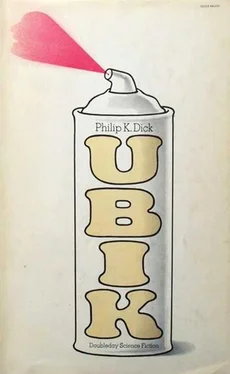Their attempts at comprehension can be seen in the different hypotheses which they develop and which occupy much of the novel: they think that Runciter has pre-recorded messages to them before his death; that Runciter is alive trying to contact them in half-life; or that Pat (Joe Chip’s wife) is an agent of Hollis and has succeeded in trapping them in a mental illusion. But as Joe Chip concedes, they can’t make it all add up; finally, he “meets” Runciter who assures him that they—not he—were killed in the explosion and are now linked together in half-life where he has been trying to communicate with them. And the inertials’ shared awareness of Des Moines in 1939 is the mental construct of the boy Jory who maintains his own half-life by feeding on the vitality of other half-lifers. Yet this final explanation is first modified, when Chip inadvertently summons into this illusion a living person from the future who replenishes his supply of Ubik, the “reality support” which protects him from Jory; and then destroyed when Runciter, upon leaving the Moratorium, discovers that all his coins and bills bear the likeness of Joe Chip.
From the first mention of half-life—a phenomenon which, according to Runciter, has “made theologians out of them all” (§2)—to the inertials’ quest for the meaning of their existence and their awareness of the forces of life and death, the narrative of Ubik continuously plays with a metaphysical dimension. Half-life is not presented as a realistic future possibility (that is to say, the novel does not explain how half-life might be possible, nor does it explore the possible moral, ethical or scientific problems raised). Thus the reader might begin by envisaging half-life as the fictional transposition of the world of ghosts and spirits into an SF novel, where the explanation is provided by pseudo-scientific assertions rather than by reference to the supernatural. Within this context both the quest for meaning and the never ending struggle between the forces of life and death have traditionally a metaphysical significance. The quest would usually rouse the reader to expect not only that there is some discernible meaning in reality, but that this meaning lies beyond or behind observable reality (teleology) and that man sometimes receives messages from the beyond about the meaning of reality (divine revelation). Jory, the negative force of illusion and death, is the devil in this Manichean allegory, while the Runciters are the agents of Ubik, the life-preserving force which is clearly analogous to God: by its name (from the Latin ubique , the root of ubiquity , one of the attributes of the Christian God), by its functions and, most explicitly, by the epigraph to the last chapter which recalls John’s “In the beginning was the Word…”:
I am Ubik. Before the universe was, I am. I made the suns. I made the worlds. I created the lives and the places they inhabit; I move them here,
I put them there. They go as I say, they do as I tell them. I am the word and my name is never spoken, the name which no one knows. I am called Ubik, but that is not my name. I am. I shall always be. (§17)
Although the reality problem is thus posed in metaphysical terms, such expectations by the reader are ultimately frustrated, and metaphysics is rejected. The characters are unable to discover any final, comprehensive meaning, and Joe Chip realizes, when he meets Jory, that there is nothing behind that reality: “Well, he thought, that’s one of the two agencies who’re at work; Jory is the one who’s destroying us—has destroyed us, except for me. Behind Jory there is nothing: he is the end” (§15). And again, when he meets Ella, he exclaims “ You’re the other one , Jory destroying us, you trying to help us. Behind you there’s no one. I’ve reached the last entities involved” (§16).
Yet Joe Chip’s discovery of the “last entities involved” is not that of a final or first cause. Jory and Ubik, although they may be seen as allegorical representations of God and the Devil, are limited, nonetheless, in several crucial ways which weaken this allegory; or rather, which suggests a criticism of such idealistic concepts as “God” or “the Devil.” In fact, Jory only “speeds up” the “normal cooling off” and death of things which is the “destiny of the universe” (§13). Nor does Jory think of himself as evil: his own half-life, he tells Chip, depends on his ability to prey on weaker half-lifers (§15) a dependance which is very similar to Joe Chip’s “ecological” argument in defence of Runciter Associates and the anti-Psis “neutralising” of Psis: “[anti-Psis] are life forms preying on the Psis, and the Psis are life forms that prey on the Norms… Balance, the full circle, predator and prey. It appears to be an eternal system; and frankly I don’t see how it could be improved” (§3).
In metaphysical terms, the thing Ubik is also an analogue to Christian “grace,” the divine assistance given man to help him through the earthly vale of tears into which he is fallen, towards the afterlife and his heavenly reward. Chip’s quest becomes, in large part, a search for Ubik (as Perceval’s quest was for the Grail, symbol of Christian grace and redemption), which will protect him from the forces of evil and death (Jory). However, Ubik’s significance as a mediating agency or signpost of metaphysical reality is undermined in several critical ways. First, it protects Chip by maintaining him an illusory reality, while covering up the “real” reality of the Moratorium. In similar fashion the established Christian religions have glossed over the human problems and injustices of reality while affirming that this existence is but the shadow of and preparation for an immaterial, ideal reality. Second, Ubik is de-sacralized through the ironic use of epigraphs, which I shall discuss in a moment, and within the narrative itself. For as Chip learns (§16), Ubik is a human invention, an image of humankind’s own struggle against entropy, rather than an image of divine assistance or guidance in that struggle. And the final reference to Ubik in the narrative is an ironical comment on divine intervention: after the attractive young woman who has materialized from the future to bring Joe Chip a spray-can of Ubik disappears, leaving him in the middle of trying to invite her to dinner, he discovers a message on the can: “I THINK HER NAME IS MYRA LANLEY. LOOK ON REVERSE SIDE OF CONTAINER FOR ADDRESS AND PHONE NUMBER” (§16).
AN EPIGRAPH IN THE FORM of an advertising jingle opens each chapter of Ubik , except that the last chapter has the epigraph quoted above, which can, however, be read as a theological super-ad, confirming the novel’s strange identification of religion and capitalist consumerism. These commercials, which have little or nothing to do with the narrative, sell Ubik as the best beer, the best instant coffee, the best shampoo….
Friends, this is clean-up time and we’re discounting all our silent, electric Ubiks by this much money. Yes, we’re throwing away the bluebook. And remember: every Ubik on our lot has been used only as directed. (§1)
The best way to ask for beer is to sing out for Ubik. Made from select hops, choice water, slow aged for perfect flavor, Ubik is the nation’s number one choice in beer. Made only in Cleveland. (§2)
If money worries have you in the cellar, go visit the lady at Ubik Savings & Loan. She’ll take the frets out of your debts. Suppose, for example, you borrow fifty-nine poscreds on an interest-only loan. Let’s see, that adds up to— (§8)
These “commercial messages” provide a restatement of Marx’s description of value, for Ubik is a universal equivalent (the embodiment of exchange value), which can represent or replace any other commodity: under capitalism everything has its price; while the presentation of Ubik through these ads stresses the obligation of capitalism to produce needs (use-values) in the consumer.
Читать дальше








